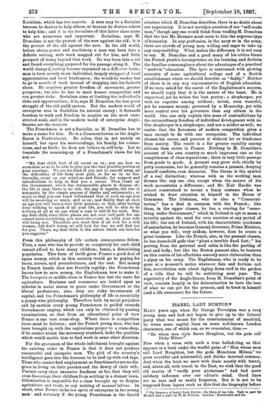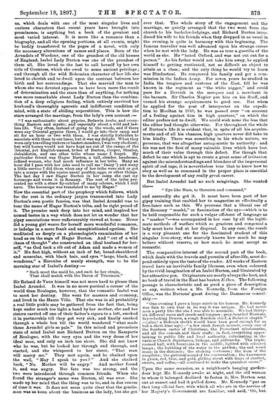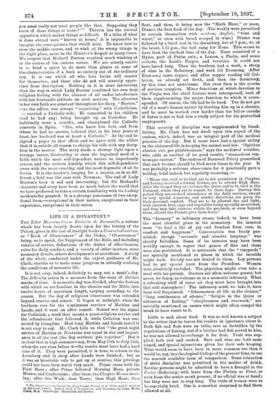ISABEL, LADY BURTON.* MANY years ago, when Sir George Trevelyan
was a very young man, and had not begun to give up to the Liberal party what was meant for the entertainment of mankind, he wrote some capital lines on some well-known London characters, one of which ran, as we remember, thus :—
"He whom men style Baron Houghton, but the gods cal/
Dicky Milnes."
Now when a verse with such a true ballad-ring as that appears in a book under the woeful guise of "Him whom men call Lord Houghton, but the gods Monckton Mines," we- grow wrathful and mistrustful, and dislike inverted commas. And when the book we meet with deals mostly with travel, and, above all, with travel in the East, we wish that the good old maxim of "verify your quotations" had had more salutary influence over our editor's mind. Good lines are so rare and so easily forgotten. But it is not to be supposed from lapses such as this that the biography before • The Romance of Isabel, Lady Burton: the Story of her Life. Told in part by, Ilarsblf and in part by W. U. 1% ilkins. London : Hutchinson and Co.
us, which deals with one of the most singular lives and curious characters that recent years have brought into prominence, is anything but a book of the greatest and most varied interest. It is more like a romance than a biography, and all the opening portions, at all events, might be bodily transferred to the pages of a novel, with only the necessary alterations of names and places. Born of the Artmdels of Wardour, one of the grandest of the old houses of England, Isabel Lady Burton was one of the proudest of them all. She loved to the last to call herself by her own title of Countess, which she owed to some ancient privilege ; and through all the wild Bohemian character of her life she loved to cherish and to dwell upon the contrast between her birth and her surroundings. That she married the man to whom she was devoted appears to have been more the result of determination and the stars than of anything, for nothing was more remarkable about Lady Burton than the combina- tion of a deep religions feeling, which entirely survived her husband's thoroughly agnostic and indifferent condition of mind, with a state of abiding superstition. This is how the stars arranged the marriage, from the lady's own account :—
"I was enthusiastic about gypsies, Bedawin Arabs, and every- thing Eastern and mystic, and especially about a wild and law- less life. Very often, instead of going to the woods, and if there were any Oriental gypsies there, I would go into their camp and sit for an hour or two with them. I was strictly forbidden to associate with them in our lanes, but it was my delight. When they were only travelling tinkers or basket-menders, I was very obedient; but wild horses would not have kept me out of the camp of the Oriental, yet English-named, tribes of Burton, Cooper, Stanley, Osbaldiston, and one other tribe whose name I forget. My particular friend was Hagar Burton, a tall, slender, handsome, refined woman, who had much influence in her tribe. Many an hour did I pass with her (she used to call me Daisy ') and many a little service I did them when any of her tribe were sick or got into a serape with the squire anent poultry, eggs, or other things. The last day I saw Hagar Burton in her camp she cast my horoscope and wrote it in Romany. The rest of the tribe pre- sented me with a straw fly-catcher of many colours, which I still have. The horoscope was translated to me by Hagar."
Now the essential part of the prophecy which follows, which for the rest is the ordinary jargon transmuted into Lady Burton's own poetic fancies, was that Isabel Arundel was to bear the name of Hagar Burton's tribe, and be right proud of it. The promise sank deep into her mind, and inspired her nomad tastes in a way which does not let us wonder that her gipsy associations were unfavourably viewed at home. Never did a young girl weave for herself more wonderful romances, Dr indulge in a more frank and unsophisticated egotism. She meditated as deeply on a phrenologist's examination of her head as on the saga of Hagar Barton. And "out of a wild chaos of thought" she constructed an ideal husband for her- self, "as God took a rib out of Adam and made a woman of it." Six feet high, without an inch of fat, broad-shouldered and muscular, with black hair, and eyes "large, black, and wondrous," a Hercules of manly strength, was to be the morning star of Isabel's destiny :—
" Such must the maid be, and such be her strain,
That shall match with the Baron of Triermain."
Sir Roland de Vanx himself was not more hard to please than Isabel ArandeL It was in no more poetical a corner of the world than Boulogne, however, that the romantic Isabel was to meet her destiny. She went for masters and economy, and lived in the Haute Ville. That she was in all probability a real little pickle may be gathered from the fact that, being kept under much too tight a hand by her mother, she and her sisters carried off one of their father's cigars to a loft, smoked it in partnership till they got very sick, and finally smoked through a whole box till the world wondered "what made those Arundel girls so pale." In this mixed and precarious state of mind Isabel met Richard Burton on the Ramparts of Boulogne, with the very eyes and the very dress of her ideal man, and only an inch too short. She did not know who he was, but he looked her through and through, and started, and she whispered to her sister, "That man will marry me." They met again, and he chalked upon the wall, "May I speak to you ? " And she chalked back, "No. Mother will be angry." And mother found it, and was angry. But fate was too strong, and the two were introduced through common friends. When she found the stranger's name was Barton, all was over. She made up her mind that the thing was to be, and in due course of time it was. It does not seem quite clear that the gentle- man was as keen about the business as the lady, but she got over that. The whole story of the engagement and the marriage, so quietly arranged that the two went from the church to his bachelor-lodgings, and Richard Burton intro- duced his wife to his friends when they dropped in as usual in the evening, is quite in harmony with this beginning. The famous traveller was well advanced upon his strange career when he met with the lady. He was as true a guerilla of the world as she. He "hated Oxford, and was not cut out for a parson." As his father would not take him away, be applied himself to getting rusticated, not so difficult an object to attain as a class ; and the only thing he would try to learn was Hindustani. He conquered his family and got a com- mission in the Indian Army. For seven years he studied in India the tongues and customs of the East, till he was known in the regiment as "the white nigger," and could pass for a Dervish in the mosques and a merchant in the bazaars. Sir Charles Napier put him on hie Staff, and.
turned his strange acquirements to good use. But when he applied for the post of interpreter on the expedi- tion to Mooltan in 1849, he was passed over "on account of a feeling against him in high quarters," on which the editor prefers not to dwell. We could wish none the less that the editor had thought otherwise. For throughout the whole of Burton's life it is evident that, in spite of all his acquire- ments and of all his chances, high quarters never did take to him kindly. There was something in his whole nature, we presume, that was altogether antagonistic to authority : and his was not the first of many valuable lives which have lost. much of their value through this defect. For though that defect be one which is apt to create a great sense of irritation against the misunderstandings and blunders of the impersonal spirit of red tape, it is nevertheless true that to know how to obey as well as to command in the proper place is essential to the development of any really great career.
But Isabel Arundel had no such misgivings. She wanted
the-
" Eye like Mars, to threaten and command,"
and assuredly she got it. It must have been part of her gipsy training that enabled her to magnetise so effectually a free-lance such as this. We presume that a liberal use a the Romany " mashii," or fascination of the eye—which is to
be held responsible for such a vulgar offshoot of language as a "masher "—was accompanied in her case by all the legiti- mate methods of warfare which so gracious and congenial a lady must have had at her disposal. In any case, the result is a very pleasant one for the fascinated student of this singular love-story, who scarcely knows how much he may believe without reserve, or how much he must accept as. romantic.
The comparative interest of the second part of the book, which deals with the travels and pursuits of after-life, must de- pend entirely upon the taste of the reader. All works of Eastern travel have an inevitable family likeness, even when coloured by the vivid imagination of an Isabel Burton, and ;11ustrated by
her attractive pen. Originators are nearly always the best, and._ no book of travel in the East has beaten Eahen. The following passage is characteristic and as good a piece of description as any, written when a Mr. Kennedy, from the Foreign Office, was the Burtons' guest during the Damascus consul- ship:— "One evening I gave a large soiree in his honour. Mr. Kennedy was fain to own that in its way it was unique. lie had never seen a party like the one I was able to assemble. We had thirty- six different races and creeds and tongues : grey-bearded Moslems,. fierce-looking Druzes, a rough Kurdish chief, a Bedawin shaykh " —[alas ! a Bedouin sheikh would have been good enough for us but a short time ago]—" a few sleek Jewish usurers, every one of the fourteen castes of Christians, the Protestant missionaries, and all the consuls and their staffs : in fact, everything apper- taining to public life and local authority, culminating in the various Church dignitaries, bishops, and patriarchs. The triple- roomed hall, with fountains in the middle, lighted with coloured lamps ; the bubbling of the water in the garden; the sad, weird music in the distance ; the striking costumes ; the hum of the nargilehs ; the guttural sound of the conversation ; the kauwassea in green, red, blue, and gold, gliding about with trays of sherbet, sweets, and coffee,—all combined to make the quaintest scene."
Upon the same occasion, as a neighbour's banging garden-. door kept Mr. Kennedy awake at night, and the old woman to whom it belonged declined to fasten it, Mrs. Burton sent out at sunset and had it pulled down. Mr. Kennedy "put on that long official face, with which all who are in the service of her Majesty's Government are familiar, and said, 'Oh, but you mast really not treat people like that. Supposing they knew of these things at home ? ' " Therein lies the eternal opposition which makes things so difficult. If a tithe of what is done abroad were "known at home," it is impossible to imagine the consequences that would arise. To know how to steer the middle course, and to wink at the wrong things in the right place, must be the Minister's despair at many times. We suspect that Richard Barton required much winking at in the course of his curious career. We are utterly unable in so brief a space to do more than glance at some of the characteristics of a book so entirely out of the ordinary run. It is one which all who love books will master for themselves, and those who do not will scarcely appre- ciate from description. Nothing in it is more interesting than the way in which Lady Burton combined her own deep religious feeling with the absence of all undue interference with her husband's attitude on such matters. The allusions to her own faith are constant throughout her diary. "Burton," says the editor, was always " coquetting " with Catholicism. le married a Catholic wife. He consented to his children (bad he had any) being brought up as Catholics. He habitually wore a crucifix, and championed the Catholic -converts in Syria. "She, who knew him best, and from whom he had no secrets, believed that, in his later years at least, her husband was at heart a Catholic." At the end he signed a paper to that effect, and we agree with the editor that it is outside all reason to charge his wife with any decep- tion in the matter. The story sheds a strange light upon a strange career, illustrating at once the ingrained need of a faith which the most self-dependent nature so imperiously craves, and the curious kinship which this self-dependence owns with the most exacting and the most dogmatic of all its forms. It is the master's longing for a master, as in so dif- ferent a field was the case with Newman. The end of Lady Burton's book is sad and interesting ; but Sir Richard's character and story have been so much before the world that we have preferred to take a certain familiarity with its leading incidents for granted. It is a strange panorama of two excep- tional lives,—exceptional in their nature, exceptional in their experience, exceptional in their union.




































 Previous page
Previous page